
The Entertainment Software Self-Regulation Body (USK) is the voluntary self-regulation body of the games industry. It is responsible for age rating reviews of digital games in Germany.
The USK is recognized as a competent self-regulator under both the German Federal Youth Protection Act and the Interstate Treaty on the Protection of Minors in the Media. In the area of the German Youth Protection Act, state representatives issue the statutory age ratings at the end of a USK procedure on the recommendation of independent youth protection experts.
In addition, the USK assigns age ratings within the international IARC system (International Age Rating Coalition) for online games and apps. In addition, the USK supports companies from the games industry in complying with and further developing the protection of minors in the gaming sector, for example in the area of technical protection of minors, and is involved in the area of media education, among other things with initiatives such as the Elternguide.online.
The games applied for USK testing are played through completely by trained volunteer reviewers and then presented to a testing panel that is independent of the games industry. The review panel consists of four youth protection experts and one permanent representative of the supreme state youth authorities (OLJB). The youth protection experts come from academia, media education, church institutions and youth facilities, and have experience in working with media and with children and young people. After extensive discussion, the youth protection experts recommend an age rating. The OLJB Permanent Representative may adopt or appeal this age release. Subsequently, the USK receives the test result and communicates it to the applicants. If they also do not appeal, triggering a new review, the game will receive the legal age rating by the OLJB’s Permanent Representation to the USK.
In the online area, the USK assigns age ratings within the framework of the international system IARC (International Age Rating Coalition). This is an association of the various organizations responsible for age rating worldwide, such as ESRB (Entertainment Software Rating Board) in the USA, PEGI (Pan European Game Information) in Europe, ClassInd (Classificação Indicativa) in Brazil, GRAC (Game Rating and Administration Committee) in South Korea, ACB (Australian Classification Board) in Australia and the USK in Germany. At IARC, online game and app providers go through a questionnaire on content relevant to youth protection. An age rating is then issued from the respective entries according to the specifications and criteria of the respective national self-regulation (for Germany, the USK). In all distribution platforms connected to this system, age ratings from the USK are thus available. Connected systems include the Google Playstore, Nintendo eShop, Xbox Store, Sony Playstation Store, and Oculus Store.
There are set criteria for the age rating of digital games. These guiding criteria are decided and adapted by the USK’s advisory board, which is made up of various social groups. The guiding criteria serve as a basis for review panels in assessing the risks of possible developmental impairment to children and adolescents when playing games that are not age-appropriate. They provide support in the decision-making process.
The focus is on the presumption of impact, i.e. the extent to which young people’s development could be impaired or even endangered. These include criteria such as the atmosphere in the game, violence or pressure to act. Since 2023, so-called “usage risks”, for example functions such as chats, in-game purchases or location sharing, have also been taken into account in the youth protection review and can have an influence on the age rating. More information about the USK’s guiding criteria can be found on the USK’s website.
The age rating symbols awarded include USK 0 (released without age restriction), USK 6, USK 12, USK 16 and USK 18 (no youth rating).
Since January 2023, the USK’s age rating labels have included additional information about the reasons for the age rating as well as existing online functions in the game. In this way, parents can see at a glance which reasons led to the age rating (for example, “comic book violence” or “pressure to act”) and which risks should be kept in mind when using media (for example, “chats”, “in-game purchases” or “location sharing”). The notices can be found on the back of the game packaging, on the corresponding online platforms and in the USK title database.
In principle, the state does not regulate with its age labels how and what media content parents make available to their children at home. However, parents should only give or allow their children to play games that have an appropriate age rating. However, the labels do not provide any information about the difficulty level of a game or its respective pedagogical suitability. An educational assessment on digital games is provided, for example, by the NRW Game Guide, which is funded by the state of North Rhine-Westphalia.
Three tips for parents from the USK: